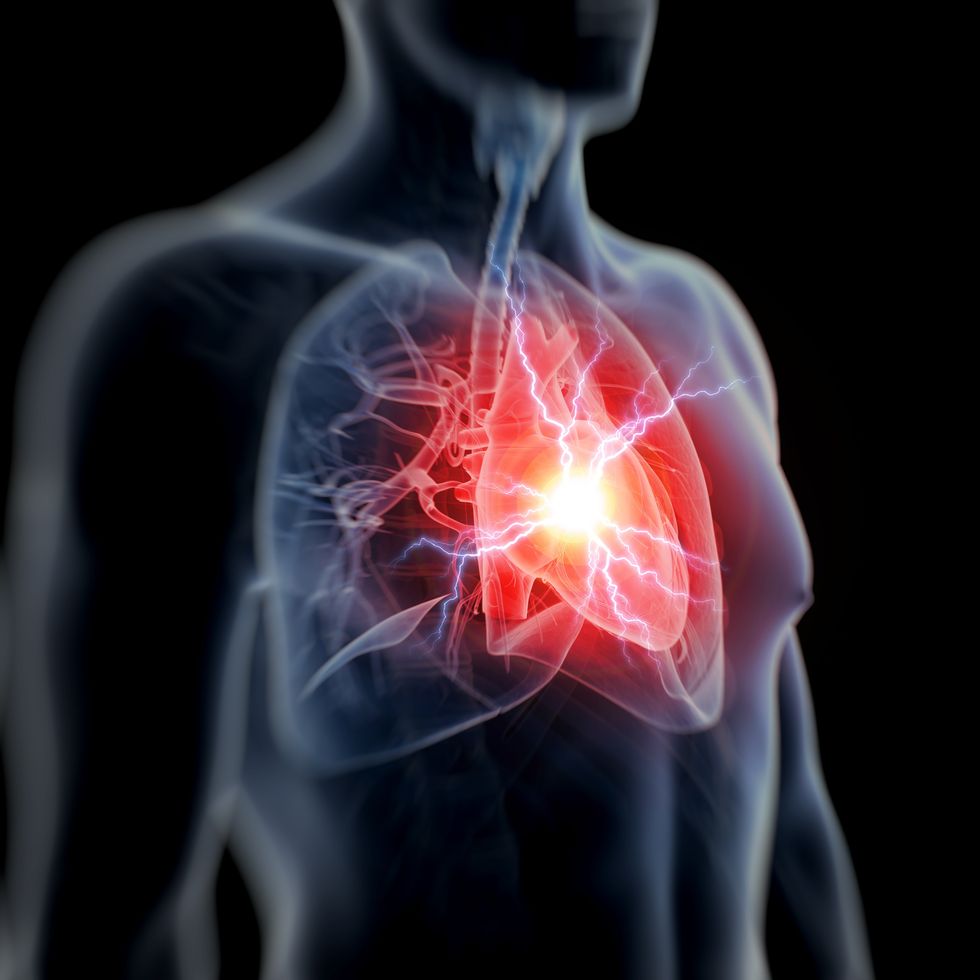Heart attack symptoms: Scientists discover subtle warning sign that can appear 10 years before

Chest pain can signal a heart attack within the next decade, research reveals
|Getty Images

The discovery could prevent thousands of avoidable deaths from heart attacks every year in the UK, scientists say
Don't Miss
Most Read
Patients presenting in hospital with chest pain - who are often reassured and sent back home - could be at risk of having a heart attack within the next decade, a groundbreaking study has revealed.
Thanks to advances in artificial intelligence, researchers were able to pinpoint small, undetectable narrowings that increase the risk of a future heart attack.
It is hoped that the groundbreaking discovery will prevent thousands of avoidable deaths every year in the UK.
In around three quarters of cases, there is no clear sign of significant narrowings, so patients are often reassured and discharged.
Unfortunately, many of these people will die from a heart attack in future, because small, undetectable narrowings may break up if they are inflamed, blocking the arteries. Until recently, it was not possible to identify these patients at risk.

Thanks to AI, researchers were able to pinpoint small, undetectable narrowings that predict a future heart attack
|Getty Images
The study, funded by the British Heart Foundation, Professor Charalambos Antoniades and his team at the University of Oxford's Radcliffe Department of Medicine, analysed data from over 40,000 people undergoing routine cardiac CT scans at eight UK hospitals. Participants were followed up for a median of 2.7 years. While those with significant coronary artery narrowings were more likely to have serious cardiac events or death, twice as many patients with no significant narrowings experienced heart attacks and cardiac deaths.
The team then used a new AI tool, trained using information on changes in the fat around inflamed arteries – which can indicate the risk of events such as heart attacks – as well as information on narrowings of the arteries and other clinical risk factors. Further testing on an additional 3,393 patients over 7.7 years revealed it could independently and accurately predict risk of cardiac events.
Among those with no obstructions to their arteries, those with the highest levels of inflammation in their blood vessels had a more than 10-fold higher risk of cardiac death compared to those with lower levels of inflammation.
In a world-first pilot, the team provided AI-generated risk scores to clinicians for 744 consecutive patients, and found that in up to 45 per cent of cases, clinicians altered patients’ treatment plans, indicating that this AI tool could be hugely valuable in guiding and informing how patients with chest pain are managed, ensuring early identification and preventative treatment of those at highest risk.
Analysis comparing the use of the AI tool to standard care revealed it was highly cost-effective for the NHS. In addition, the researchers estimate that implementing this technology in the NHS could lead to over 20 per cent fewer heart attacks and eight per cent fewer cardiac deaths and strokes, among those having the test.
With the technology required to power the AI tool already commissioned by NHS England for a pilot programme in five NHS hospitals, the researchers are hopeful that it could soon be rolled out across the UK.
Professor Charalambos Antoniades, BHF Chair of Cardiovascular Medicine and Director of the Acute Multidisciplinary Imaging & Interventional Centre, at the University of Oxford, said: "Our study found that some patients presenting in hospital with chest pain – who are often reassured and sent back home – are at high risk of having a heart attack in the next decade, even in the absence of any sign of disease in their heart arteries. Here we demonstrated that providing an accurate picture of risk to clinicians can, alter and potentially improve the course of treatment for many heart patients.
"We hope that this AI tool will soon be implemented across the NHS, helping prevent thousands of avoidable deaths from heart attacks every year in the UK."
LATEST DEVELOPMENTS

If you think you're having a heart attack, pop an aspirin why you wait for an ambulance to arrive, advises the NHS
|Getty Images
Professor Sir Nilesh Samani, Medical Director at the British Heart Foundation, said: "This research shows the valuable role AI-based technology can play in better identifying those patients most at risk of future heart attacks and thereby help clinicians make better treatment decisions for their patients.
"Too many people are needlessly dying from heart attacks each year. It is vital we harness the potential of AI to guide patient treatment, as well as ensuring that the NHS is equipped to support its use. We hope that this technology will ultimately be rolled out across the NHS, and help to save the lives of thousands each year who may otherwise be left untreated."
How to respond
The AI tool buys those at risk time to act before it's too late but many people will be less fortunate.
That's why it's imperative to know how to respond to a heart attack.
The NHS says to call 999 immediately if you think you might be having a heart attack. The faster you act, the better your chances.
"If aspirin is available and you are not allergic to it, slowly chew and then swallow an adult-size tablet (300mg) while you wait for the ambulance," advises the health body.
Aspirin helps to thin your blood and improve blood flow to your heart.










